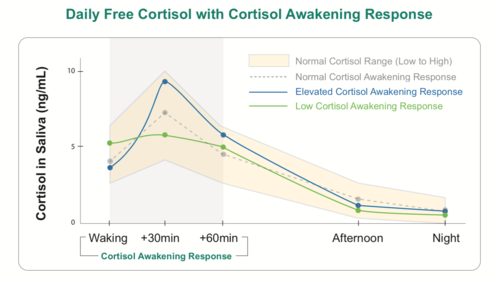High cortisol symptoms can keep you up later into the evening and make it very frustrating when you try to fall asleep. High cortisol symptoms can also wake you up in the middle of the night.
What is cortisol?
Cortisol is a hormone produced by the adrenal glands (which sit on top of the kidneys). The adrenal glands have a close relationship with the brain and have an incredible communication system through the HPA axis, which stands for Hypothalamic Pituitary Adrenal axis.
The cortisol has a big reputation as a stress hormone, as if it was bad. Actually, when the cortisol gets produced in response to stress, it is to help you deal with the danger at hand. This danger could be real or imagined in our minds (worry, ruminating, anxiety, etc).
It also helps regulate your blood sugar and never allows it to go too low, which would be very dangerous. Cortisol plays an important part in regulating your blood pressure, supports good bone health and it’s a powerful anti inflammatory agent.
High Cortisol Symptoms
The first stage of cortisol imbalance is when the cortisol starts running high. The cortisol should have a specific curve, just like in the picture below.

Extremely high levels of cortisol is diagnosed as Cushing’s disease and is associated with symptoms such as weight gain around the middle, fat loss from arms and legs, fatty deposits around the neck, purple stretch marks, and a rounded face (also called moon face). If you find yourself in these symptoms, contact your medical doctor.
What is a lot more common than Cushing’s disease is milder elevation of cortisol due to stress. This stress could be either mental, physical, or emotional, or it could be because of internal stressors such as gut infections, food sensitivities, sleep apnea, injuries, over exercise and toxin exposures.
Example of high cortisol symptoms:
- feeling tired but wired in the evening
- waking up at night
- feeling constantly on edge
- mood swings
- irregular periods
- poor sex drive
- weight gain
- headaches
- gastrointestinal issues
- elevated blood sugar
Tests to identify if you have high cortisol levels
The best test to identify if you indeed have high cortisol levels is a Cortisol Awakening Response saliva test. This test looks at your cortisol levels 6 times (cortisol can be measured a 7th time if you are up at night) during a 24 hours period and it gives us an idea of what your body does within one full day.
Based on the test results, we can use lifestyle changes, herbs and supplements to help your body remember a healthier pattern.
What happens when you have high cortisol levels?
Before I tell you how to regulate high cortisol levels, I am going to tell you something that may surprise you: if you do nothing in order to lower the high cortisol levels, the next stage of cortisol imbalance is actually lower cortisol levels. Unfortunately, this is not as good as you would think.
As you live in stress with high cortisol levels for a while, your body recognizes that the chronic elevated cortisol levels are damaging to the body. So in order to protect you, a disconnection happens between the brain and the adrenal glands. The brain no longer signals the adrenals to produce it as much (it relies on other hormones for stress response).
You would think this is good, but what happens is that now you have lower than normal cortisol levels so you struggle with energy, may feel dizzy and weak, have sugar cravings, and you may still not be able to sleep very well. Often when the cortisol is low, it will still have a higher than normal spike at night and that will make it hard to fall asleep, in spite of being tired.
How to lower your cortisol and improve your high cortisol symptoms
There are three levels to improving the health of your cortisol levels.
- Work on stress management in your everyday life. One of the best ways to start working on your sleep and daily routine is by reading my article 9 Tips for Sleep Hygiene That Actually Work. That article is a lot more than just about sleep, it is about a 24/7 lifestyle that can not only improve your high cortisol levels but also increase your happiness and wellbeing.
- Find out if there are any other internal stressors. As mentioned earlier, gut inflammation or general inflammation can increase your cortisol levels. Undiagnosed and untreated sleep apnea can increase your cortisol levels and wake you up at night. These are just examples among numerous possibilities. A practitioner such as a naturopath or functional medicine practitioner can generally best serve you to identify the root cause of your high cortisol, or whether you have high cortisol indeed.
- Something that you can do on your own and can benefit you is taking adaptogenic herbs such as Ashwagandha, Rhodiola and Holy basil (found in formulas such as HPA Adapt from Integrative Therapeutics). These herbs help regulate cortisol levels and can help with both too high and too low levels of cortisol. If testing confirms high cortisol levels I use supplements that contain phosphatidylserine to lower the cortisol. It’s important to test before taking this type of supplement in order to use the proper dosage and at the right time based on both your symptoms and the saliva test results.
High cortisol symptoms, especially when it comes to sleepless nights, are very common in the Western culture. Follow the suggestions above and if you need testing or you have additional questions, simply schedule a consult or an initial session at this link and I’d be happy to help.




